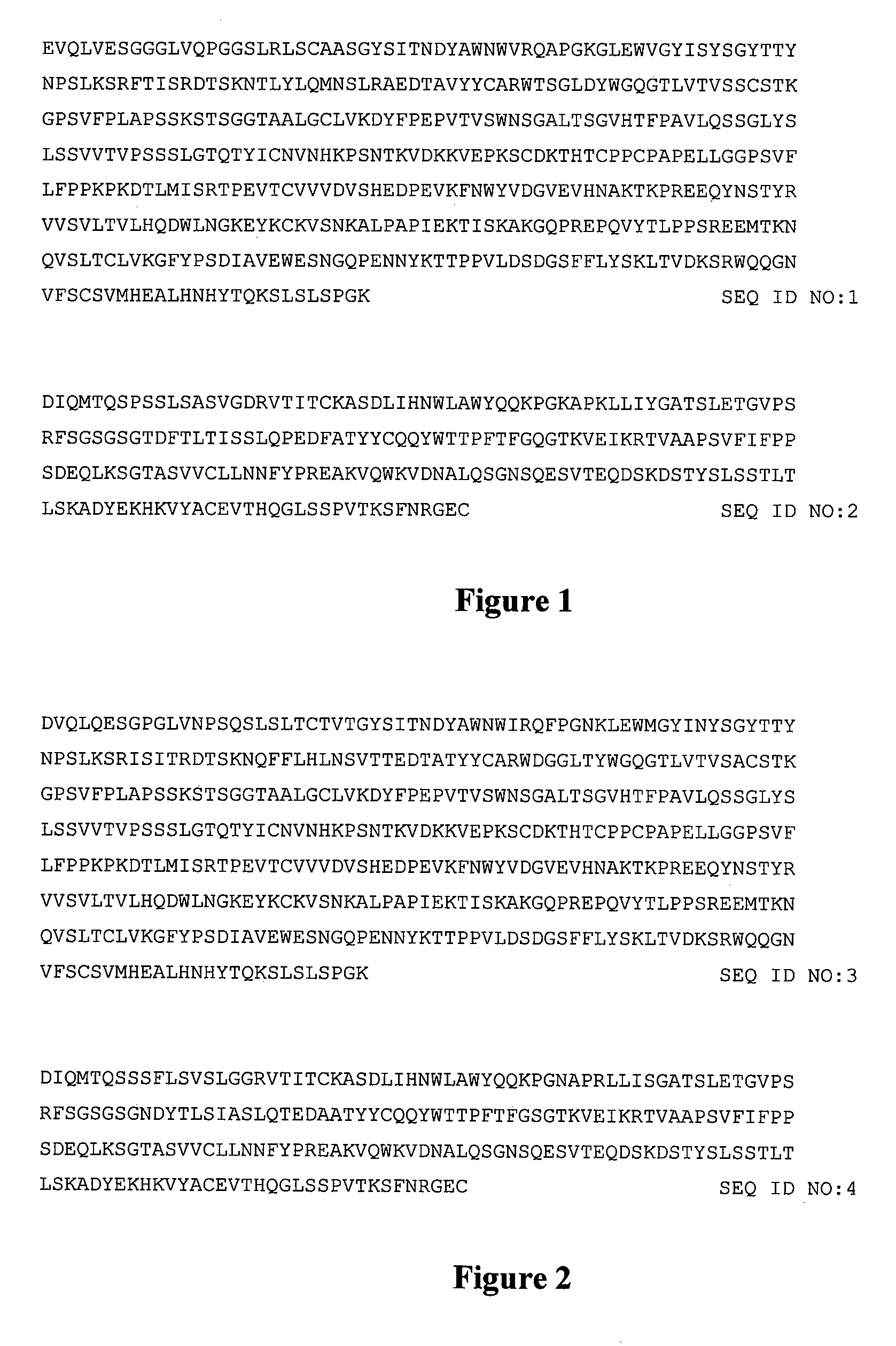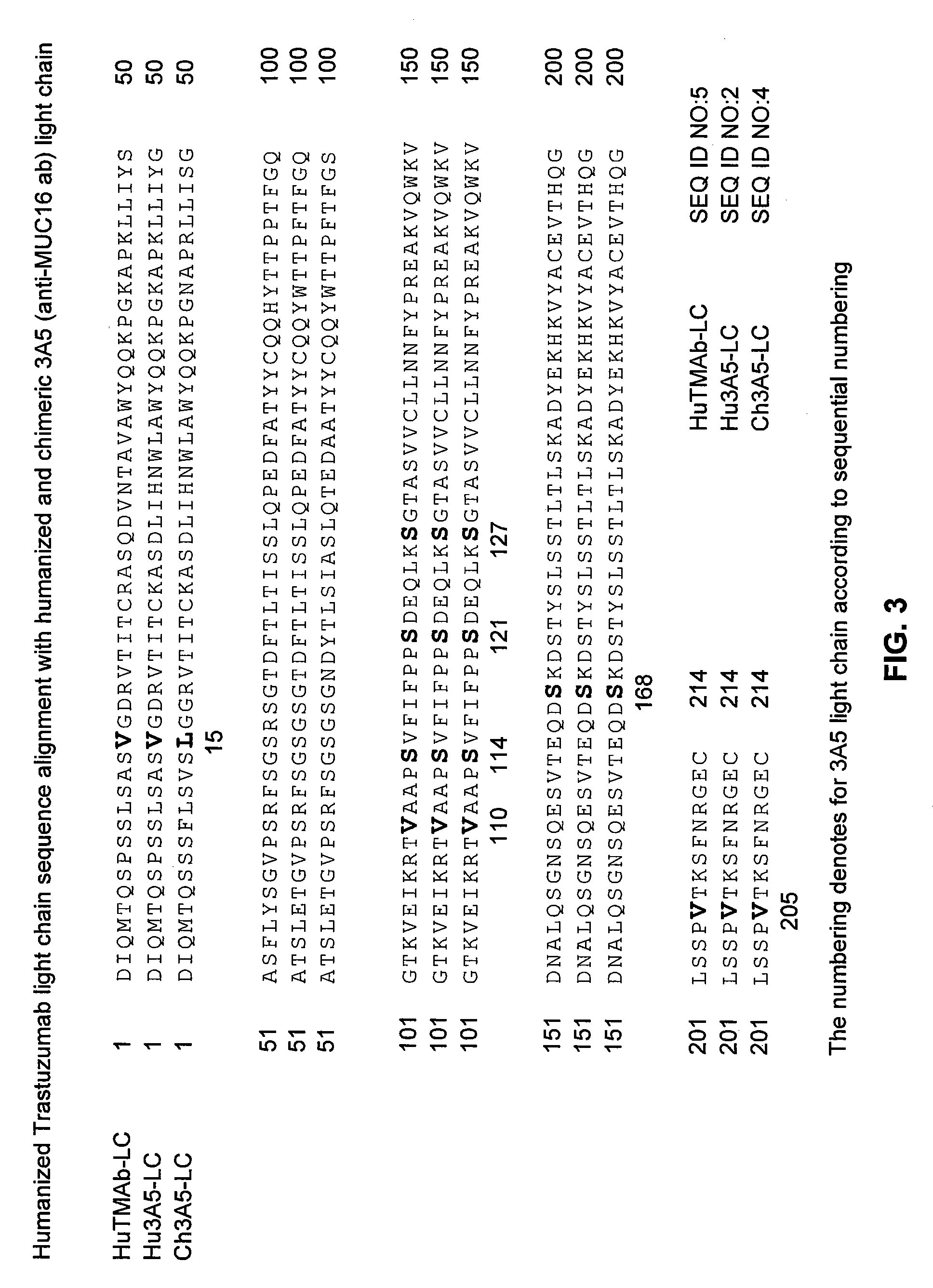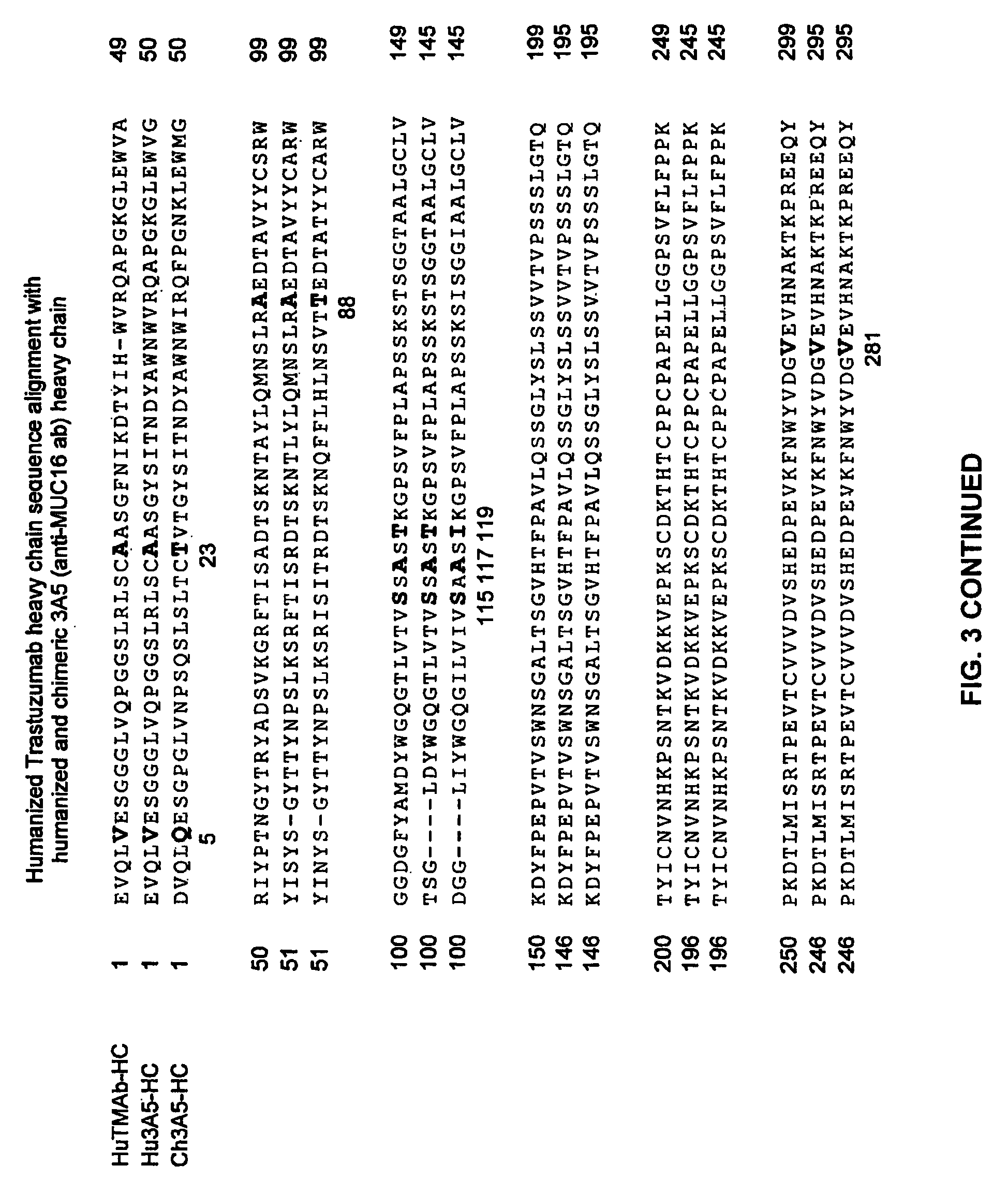Cysteine engineered anti-MUC16 antibodies and antibody drug conjugates
a technology of cysteine engineered anti-muc16 antibodies and conjugates, which is applied in the field of antibodies, can solve the problems of nonreproducible multi-step conjugation process, insufficient analytical and preparative methods to separate and characterize antibody-drug conjugate species, and perturbing the antibody behavior
- Summary
- Abstract
- Description
- Claims
- Application Information
AI Technical Summary
Benefits of technology
Problems solved by technology
Method used
Image
Examples
example 1
Preparation of Anti-MUC16 3A5 Antibodies
[0376]Humanized and chimeric 3A5 anti-Muc16 3A5 antibodies (FIGS. 3 and 4) were prepared according to WO 2007 / 001851, the sequences and antibodies of which are incorporated by reference.
[0377]Light chain amino acids are numbered according to Kabat (Kabat et al., Sequences of proteins of immunological interest, (1991) 5th Ed., US Dept of Health and Human Service, National Institutes of Health, Bethesda, Md.). Heavy chain amino acids are numbered according to the Eu numbering system (Edelman et al (1969) Proc. Natl. Acad of Sciences 63(1):78-85), except where noted as the Kabat system. Single letter amino acid abbreviations are used.
[0378]Humanized (thio hu) and chimeric (thio ch) cysteine engineered anti-MUC16 3A5 monoclonal antibodies as A117C variants were expressed and purified, including the two embodiments:
[0379]thio hu anti-MUC16 HC A117C 3A5: MW=144834.84; pI=8.28; pI(oxidized C)=8.79; Length=1320; Ext. Coef. (280)=1.61. Heavy Chain 446 ...
example 2
Preparation of Cysteine Engineered Anti-MUC16 Antibodies for Conjugation by Reduction and Reoxidation
[0381]Full length, cysteine engineered anti-MUC16 monoclonal antibodies (ThioMabs) expressed in CHO cells bear cysteine adducts (cystines) or glutathionylated on the engineered cysteines due to cell culture conditions. To liberate the reactive thiol groups of the engineered cysteines, the ThioMabs are dissolved in 500 nM sodium borate and 500 mM sodium chloride at about pH 8.0 and reduced with about a 50-100 fold excess of 1 mM TCEP (tris(2-carboxyethyl)phosphine hydrochloride; Getz et al (1999) Anal. Biochem. Vol 273:73-80; Soltec Ventures, Beverly, Mass.) for about 1-2 hrs at 37° C. Alternatively, DTT can be used as reducing agent. The formation of inter-chain disulfide bonds was monitored either by non-reducing SDS-PAGE or by denaturing reverse phase HPLC PLRP column chromatography. The reduced ThioMab (FIG. 6a) is diluted and loaded onto a HiTrap S column in 10 mM sodium acetate,...
example 3
Conjugation of Cysteine Engineered Anti-MUC16 Antibodies and Drug-Linker Intermediates
[0385]After the reduction and reoxidation procedures of Example 2, the cysteine engineered anti-MUC16 antibody is dissolved in PBS (phosphate buffered saline) buffer and chilled on ice. About 1.5 molar equivalents relative to engineered cysteines per antibody of an auristatin drug linker intermediate, such as MC-MMAE (maleimidocaproyl-monomethyl auristatin E), MC-MMAF, MC-val-cit-PAB-MMAE, or MC-val-cit-PAB-MMAF, with a thiol-reactive functional group such as maleimido, is dissolved in DMSO, diluted in acetonitrile and water, and added to the chilled reduced, reoxidized antibody in PBS. After about one hour, an excess of maleimide is added to quench the reaction and cap any unreacted antibody thiol groups. The reaction mixture is concentrated by centrifugal ultrafiltration and the cysteine engineered anti-MUC16 antibody drug conjugate is purified and desalted by elution through G25 resin in PBS, fi...
PUM
| Property | Measurement | Unit |
|---|---|---|
| pH | aaaaa | aaaaa |
| retention time | aaaaa | aaaaa |
| retention time | aaaaa | aaaaa |
Abstract
Description
Claims
Application Information
 Login to View More
Login to View More - R&D
- Intellectual Property
- Life Sciences
- Materials
- Tech Scout
- Unparalleled Data Quality
- Higher Quality Content
- 60% Fewer Hallucinations
Browse by: Latest US Patents, China's latest patents, Technical Efficacy Thesaurus, Application Domain, Technology Topic, Popular Technical Reports.
© 2025 PatSnap. All rights reserved.Legal|Privacy policy|Modern Slavery Act Transparency Statement|Sitemap|About US| Contact US: help@patsnap.com



